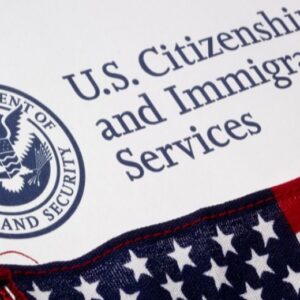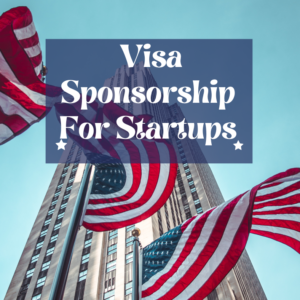USA visa sponsorship for non-profit organizations and Immigration Benefits; The United States is a land of opportunity, attracting skilled and talented individuals from around the world. For non-profit organizations, securing visas for foreign nationals with specialized skills can be crucial to fulfilling their missions. This comprehensive guide equips non-profit organizations and aspiring foreign workers with the knowledge and strategies to navigate the US visa sponsorship process and unlock the mutual benefits of working together.
Why Consider US Visa Sponsorship for Non-Profit Organizations?
US visa sponsorship offers a win-win situation for both non-profit organizations and foreign workers:
- Filling Critical Skill Gaps: Non-profits often require specialized talent that may not be readily available in the US workforce. Sponsoring foreign workers allows them to fill these gaps and advance their mission effectively.
- Attracting Diverse Expertise: Foreign workers bring unique perspectives and experiences to the table, enriching the non-profit’s work and fostering innovation.
- Career Advancement for Foreign Workers: Visa sponsorship opens doors for skilled professionals to contribute their talents in the US and potentially gain valuable experience on a global stage.
Understanding Nonprofits
What Defines a Nonprofit
Nonprofit organizations, commonly known as NPOs, are entities that operate for a charitable purpose rather than financial gain. NPOs rely on donations, grants, and fundraising to support their activities. These organizations allocate funds towards programs and services that align with their mission to benefit society. Causes such as education, healthcare, environmental conservation, and social welfare are common focuses for NPOs. Within these organizations, individuals can hold positions ranging from volunteers and interns to executive directors and program managers.
Nonprofit organizations play a crucial role in addressing societal issues and improving the quality of life for communities in need. They often work towards creating positive social change by providing essential services and advocating for marginalized groups. By supporting NPOs, individuals can contribute to meaningful causes and make a difference in the world. The diverse range of positions within NPOs allows individuals with varying skills and expertise to find roles that match their interests and passions.
Benefits for Nonprofits
Working for a nonprofit organization offers employees a range of benefits beyond financial compensation. NPO employees often experience a strong sense of purpose and fulfillment from contributing to meaningful causes. This sense of fulfillment can lead to increased job satisfaction and overall well-being. NPO employees have the opportunity to make a direct impact on society through their work, which can be highly rewarding.
One significant advantage of working for an NPO is the potential for green card sponsorship for foreign employees. Nonprofit organizations that qualify as H-1B cap-exempt employers may sponsor foreign workers for green cards through employment-based immigrant visas. This provides international employees with the opportunity to obtain permanent residency in the United States while continuing to contribute to important causes.
Benefits for Nonprofits
Another advantage of working for a nonprofit organization is the opportunity to engage in diverse projects that cater to various community needs. NPO employees often have the chance to work on initiatives that address pressing social issues or promote cultural understanding. This exposure allows individuals to broaden their skill set, gain valuable experience across different sectors, and develop a deeper understanding of societal challenges.
Visa Sponsorship Overview
Basics of Visa Sponsorship
Visa sponsorship is crucial for non-profit organizations (NPOs) looking to hire individuals from other countries. The process involves the sponsorship of visas for employees who do not hold US citizenship or permanent residency. NPOs must meet specific requirements to sponsor visas, including demonstrating the need for hiring an individual from overseas. Compliance with visa regulations is essential to avoid legal issues.
Non-profit organizations need to navigate the visa sponsorship process carefully. They must first determine the appropriate visa category for the employee they wish to sponsor. This could range from temporary work visas like the H-1B visa to permanent residency options. Meeting all the necessary requirements, such as proving that there are no qualified US workers available for the position, is vital for successful visa sponsorship.
Complying with visa regulations is not just a legal requirement but also ensures ethical employment practices within non-profit organizations. By sponsoring visas correctly, NPOs contribute to diversity in their workforce and provide opportunities for talented individuals from around the world. Understanding the importance of following visa regulations helps NPOs maintain a positive reputation and avoid any potential legal implications.
H-1B Visas Explained
H-1B visas play a significant role in enabling non-profit organizations to hire skilled foreign workers. These visas are specifically designed for individuals in specialty occupations and require employers to meet certain criteria when sponsoring applicants. For NPO employees, obtaining an H-1B visa opens up opportunities to work in specialized roles that benefit their organization’s mission.
Qualifying for an H-1B visa involves demonstrating that the applicant possesses specialized skills and knowledge essential for their intended role at the non-profit organization. NPOs must show that they offer fair wages and working conditions to sponsored employees. The unique elements of the H-1B process for NPOs include proving that the position directly contributes to fulfilling the organization’s charitable or humanitarian objectives.
The benefits of H-1B visas extend beyond individual employees to non-profit organizations as a whole. By sponsoring skilled foreign workers through H-1B visas, NPOs can access a diverse talent pool and fill critical positions that support their missions effectively. These visas enable NPOs to bring in expertise from around the world, fostering innovation and growth within their organizations while positively impacting their communities.
H-1B Visas for Nonprofits
Nonprofit Eligibility
Nonprofit organizations seeking H-1B visa sponsorship must meet specific eligibility criteria. These include proving their nonprofit status, demonstrating a legitimate need for the foreign worker’s skills, and ensuring compliance with all relevant laws. NPOs must showcase that the sponsored position aligns with their charitable mission.
To qualify for H-1B visa sponsorship, nonprofits must establish a clear affiliation with an institution of higher education or a related nonprofit entity. This affiliation is crucial as it helps validate the nonprofit organization’s legitimacy and ensures that the sponsored position serves a charitable or educational purpose. By meeting this requirement, NPOs can strengthen their case for visa sponsorship.
One significant advantage for nonprofits seeking H-1B visa sponsorship is exemption from the annual numerical cap imposed on traditional H-1B visas. This exemption allows NPOs to sponsor foreign workers without being subject to the limitations that apply to for-profit companies. As a result, nonprofits have more flexibility in hiring skilled professionals from abroad to support their philanthropic endeavors.
The application process for H-1B visa sponsorship differs slightly for nonprofits compared to for-profit entities. Nonprofits are required to submit additional documentation, such as proof of their tax-exempt status and details of their affiliation with a qualifying institution. By following these specific guidelines, NPOs can navigate the application process smoothly and increase their chances of securing visa sponsorship for foreign workers.
Advantages in Sponsorship
Sponsorship of H-1B visas offers several advantages for workers employed by nonprofit organizations. Firstly, it provides an opportunity to engage in meaningful work that contributes to societal welfare. Foreign workers in NPOs often find fulfillment in knowing that their skills are being used to make a positive impact on communities in need.
Working in a nonprofit setting through H-1B visa sponsorship enables individuals to directly contribute to community development initiatives, humanitarian projects, and social causes. This hands-on involvement allows foreign workers to witness the tangible effects of their efforts and fosters a sense of accomplishment and purpose in their professional roles.
Moreover, the impact of nonprofit work extends beyond individual fulfillment—it positively affects the community at large. By sponsoring skilled professionals through H-1B visas, nonprofits can enhance their capacity to deliver essential services, implement innovative programs, and address pressing social issues effectively. This collective effort leads to stronger communities and improved quality of life for those served by nonprofit organizations.
In addition to the intrinsic rewards of working in nonprofits through H-1B visa sponsorship, there are considerable career growth prospects available to foreign workers. These opportunities may include professional development initiatives, leadership roles within the organization, networking with industry experts, and gaining valuable experience in diverse fields. As such, NPOs provide an enriching environment for skilled professionals looking to advance their careers while making a difference in society.
Navigating the H-1B Process
Application Steps
To initiate the visa application process, individuals must first secure a job offer from a U.S.-based nonprofit organization. Once the offer is in place, the employer files Form I-129, Petition for a Nonimmigrant Worker, with USCIS on behalf of the employee.
The documentation required for visa sponsorship includes proof of qualifications, job offer letter, Labor Condition Application (LCA) certified by the Department of Labor, and any other supporting documents requested by USCIS. It’s crucial to ensure all paperwork is accurate and complete to avoid delays.
Nonprofit organizations play a vital role in the application process by providing employment opportunities to foreign workers who possess specialized skills not readily available in the U.S. labor market. They serve as sponsors and are responsible for complying with visa regulations.
When it comes to the timeline for visa approval, processing times can vary based on caseloads and individual circumstances. Typically, it takes several months for USCIS to review and approve H-1B petitions. It’s essential for applicants to stay informed about their case status throughout the process.
Key Considerations
One of the key considerations for NPOs engaging in visa sponsorship is understanding the financial responsibilities involved. Sponsoring an employee for an H-1B visa entails covering certain fees and ensuring compliance with wage requirements set by law.
In terms of legal implications, NPOs must adhere to strict regulations governing visa sponsorship. Any violations or non-compliance with immigration laws can result in penalties, fines, or even loss of sponsorship privileges. It’s imperative to stay updated on evolving immigration policies.
Compliance with immigration laws is paramount when it comes to visa sponsorship. Organizations must maintain accurate records, follow proper filing procedures, and adhere to all relevant regulations to avoid legal repercussions. Seeking guidance from experienced immigration lawyers can help navigate these complexities effectively.
Immigration lawyers play a crucial role in the process by providing expert advice on visa matters, assisting with paperwork preparation, and representing organizations during audits or investigations. Their expertise ensures that NPOs remain compliant with immigration laws while supporting foreign talent acquisition efforts.
Immigration Benefits
For Nonprofit Workers
Nonprofit workers should carefully evaluate job offers to ensure they align with their career goals and visa requirements. Understanding the job responsibilities and the organization’s commitment to visa sponsorship is crucial.
Career opportunities in nonprofit organizations offer meaningful work that can positively impact society. Employees can contribute to various causes, such as healthcare, education, and social services, enhancing their professional growth.
Working with immigration lawyers provides expertise in navigating complex visa processes. These professionals offer guidance on visa options, documentation requirements, and legal compliance, ensuring a smooth application process.
Securing a visa through nonprofit employment involves several steps. Nonprofit workers must first obtain a job offer from an eligible organization willing to sponsor their visa. They then need to gather necessary documents, complete visa applications accurately, and attend any required interviews. Seeking legal advice throughout the process can streamline the application and increase its chances of approval.
For the Organizations
Nonprofit organizations seeking visa assistance can contact MVP Law Group for expert guidance. With years of experience in immigration law, MVP Law Group specializes in assisting organizations with foreign national employees.
MVP Law Group boasts a team of experienced attorneys who possess in-depth knowledge of immigration laws and regulations. Their expertise allows them to provide tailored solutions for visa sponsorship needs specific to nonprofit organizations.
The services offered by MVP Law Group include assessing eligibility for various visa categories, preparing thorough documentation for visa applications, and representing clients in interactions with government agencies. This comprehensive support ensures that organizations meet all legal requirements for sponsoring foreign national employees.
Seeking legal guidance for visa sponsorship offers numerous benefits to organizations. It helps ensure compliance with immigration laws, reduces the risk of application errors or delays, and increases the likelihood of successful visa approvals for foreign national employees.
Closing Thoughts
The intricacies of visa sponsorship for non-profit organizations demand a nuanced understanding of immigration regulations and the unique challenges faced by these entities. Navigating the complexities of H-1B visas within this sector requires careful attention to detail and a proactive approach to compliance. By exploring the specific requirements and benefits associated with such sponsorships, organizations can better equip themselves to attract and retain top talent from around the globe.
As the landscape of immigration continues to evolve, staying informed and proactive in visa sponsorship processes is paramount for non-profits seeking to make a global impact. Understanding the opportunities and limitations presented by H-1B visas can pave the way for smoother transitions and enhanced contributions from foreign professionals. Embracing these insights will not only benefit individual organizations but also contribute to the broader mission of fostering diversity and innovation within the non-profit sector.
Frequently Asked Questions
How do non-profit organizations sponsor visas for individuals?
Non-profit organizations can sponsor visas for individuals by applying for H-1B visas, which allows them to employ foreign workers in specialty occupations. The organization must meet specific requirements and file a petition with the U.S. Citizenship and Immigration Services (USCIS).
What are the benefits of obtaining an H-1B visa through a non-profit organization?
Obtaining an H-1B visa through a non-profit organization allows skilled foreign workers to work legally in the U.S., providing opportunities for both the individual and the organization. It also contributes to diversity in the workforce and promotes knowledge exchange.
What is the process of obtaining an H-1B visa through a non-profit organization?
The process involves the non-profit organization filing a Form I-129 petition with the USCIS on behalf of the prospective employee. If approved, the individual can then apply for an H-1B visa at a U.S. consulate or embassy abroad before entering the country to work for the sponsoring organization.
Are there any specific requirements that non-profit organizations must meet to sponsor visas?
Non-profit organizations must demonstrate their eligibility by showing that they are engaged in activities that qualify them as nonprofit entities under U.S. law. They must also prove that they have the financial ability to pay the offered wage to the sponsored employee and comply with all relevant regulations.
Can individuals sponsored by non-profit organizations transition to permanent residency (green card) status?
Yes, individuals sponsored by non-profit organizations through an H-1B visa may be eligible to transition to permanent residency status (green card). This process typically involves securing employment-based immigrant petitions and meeting specific criteria set by the USCIS and Department of Labor.




